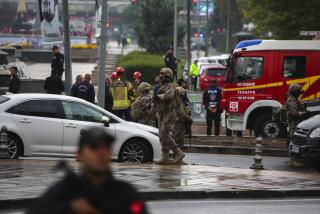The Honeymoon Is Over for Turkish Government
- Share via
ISTANBUL, Turkey — Six months ago, voters angered by decades of corruption and mismanagement swept the novice Justice and Development Party into office, hoping that this nation’s first single-party government in 15 years could end a recession that had left 2 million people jobless.
Despite qualms over the party’s Islamist roots, Western-oriented business leaders welcomed the result. Financial markets soared, interest rates fell and this predominantly Muslim country of 67 million people seemed ready to rise to its economic potential.
But foreign policy setbacks and rising tensions between the new government and the nation’s armed forces have eroded much of that optimism.
“Today there are few signs that they can fix the economy or that they have even devised a policy to do so,” said Cuneyt Ulsever, a liberal economist and commentator for the newspaper Hurriyet.
Friction With the West
Gloom has spread across boardrooms here in the country’s financial capital since parliament rejected a bill that would have enabled the United States to deploy combat troops in Turkey for the attack on Iraq.
Turks opposed to the war were delighted by the March 1 vote, but relations with the country’s most powerful ally were badly damaged. So were Turkey’s finances when the Bush administration withdrew $6 billion in conditional grants that would have helped cushion the effects of the war next door.
Any hope that the loss would be offset by financial help from European nations that also opposed the war dimmed when the government refused in March to sign off on a United Nations plan to reunite the island of Cyprus. The island is divided between Greek Cypriot and Turkish Cypriot governments. European leaders saw Turkey’s rebuff as an obstacle to its bid to join the European Union, which has accepted Cyprus’ Greek government as a member.
Turkey’s isolation over Iraq and Cyprus has “limited the room for maneuver on the economy,” said a senior Western diplomat in Ankara, the Turkish capital. “This has sharply reduced their capacity to deliver much this year and next.”
“We were counting on the [U.S.] cash to roll over our debt,” said Reha Denemec, a Justice and Development lawmaker and advisor to the government on economic policy. “Losing it was a big blow.”
Turkey’s total debt stands at $200 billion. With $93.4 billion worth of debt repayments due this year, “the chief worry is whether the government can continue to repay its debt by successfully lowering interest rates,” said Atif Cezairli, the Istanbul-based head of research for the Dutch bank ING.
That, in turn, hinges on whether the government can rebuild confidence in the markets.
“The upside of the crisis with America is that it’s forcing the government to learn to stand on its own feet,” said Mustafa Koc, chairman of Turkey’s largest industrial conglomerate, Koc Holdings.
Strapped for Cash
The government has felt obliged to abandon some populist campaign promises. By agreeing to raise taxes and slash public spending, it convinced the International Monetary Fund late last month to disburse a long-delayed $703-million loan that is part of a three-year bailout package worth $16 billion.
And despite the chill in ties, the Bush administration has invited Turkey to bid for contracts to rebuild Iraq and has secured congressional approval for a $1-billion grant to shore up the Turkish economy. The funds can be used to leverage loans totaling $8 billion.
“The Turks didn’t ask for the money; we offered it,” a U.S. official said. “We simply can’t afford to let Turkey sink at this time.”
The relatively quick end of the war has boosted expectations that tens of thousands of Western tourists who had canceled bookings for vacations in Turkey will come after all, bringing needed foreign currency.
“Those who predicted disaster have been proven wrong,” Prime Minister Recep Tayyip Erdogan said recently, following news that annual interest rates had fallen back to a postelection low of around 50%.
He may have spoken too soon. Latent tension between the ruling party and the armed forces, self-appointed guardians of Turkey’s secularist traditions, is rising to the surface, threatening the kind of political instability that has plagued the country in the past.
Senior military commanders failed to show up at a recent ceremony after learning that the parliament speaker’s wife would be there in a traditional Muslim head scarf, in defiance of a ban on such religious wear at public functions.
The armed forces have seized power directly three times in the last four decades and helped force Turkey’s first Islamist-led government to resign in 1997 on the thinly supported charge that it was seeking to impose religious rule.
Military commanders are unswayed by Erdogan’s more recent disavowal of his previously outspoken Islamist beliefs. They are alarmed by the recent appointment of scores of his allegedly Islamist cronies to key government posts, including the presidency of Turkey’s largest state-run bank.
“Another standoff between the army and the politicians may not bring down the government,” a European diplomat said, “but it will certainly kill any remaining hopes of economic recovery in the near term.”
More to Read
Sign up for Essential California
The most important California stories and recommendations in your inbox every morning.
You may occasionally receive promotional content from the Los Angeles Times.












